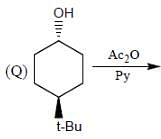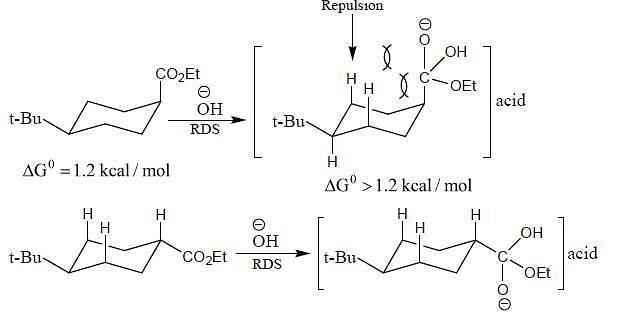Chemistry Exam > Chemistry Questions > The correct option regarding following reacti...
Start Learning for Free
The correct option regarding following reaction P, Q, R and S is








- a)Rate of reactions of (P) and (R) are faster than reactions of (Q) and (S) respectively
- b)Rate of reactions of (P) and (R) are slower than reactions of (Q) and (S) respectively
- c)Rate of (P)/(Q) and (R)/(S) are equal
- d)All above reactions proceeds through elimination mechanism.
Correct answer is option 'B'. Can you explain this answer?
| FREE This question is part of | Download PDF Attempt this Test |
Verified Answer
The correct option regarding following reaction P, Q, R and S isa)Rate...
The rate of esterification and the rate of saponification will depend on ΔG for the rate determining step. In the emample, the steric requirements of OH and CO2 Et ate greater in tetrahedral intermediate than in the ground state. Hence, ΔG0 axial/eq is enhanced over ΔG0 axial/equatorial for the staring materials. Thus, the equatorial isomers Q,S will react faster than the corresponding axial isomers, P, R.
Esterification:



Esterification:




|
Explore Courses for Chemistry exam
|

|
The correct option regarding following reaction P, Q, R and S isa)Rate of reactions of (P) and (R) are faster than reactions of (Q) and (S) respectivelyb)Rate of reactions of (P) and (R) are slowerthan reactions of (Q) and (S) respectivelyc)Rate of (P)/(Q) and (R)/(S) are equald)All above reactions proceeds through elimination mechanism.Correct answer is option 'B'. Can you explain this answer?
Question Description
The correct option regarding following reaction P, Q, R and S isa)Rate of reactions of (P) and (R) are faster than reactions of (Q) and (S) respectivelyb)Rate of reactions of (P) and (R) are slowerthan reactions of (Q) and (S) respectivelyc)Rate of (P)/(Q) and (R)/(S) are equald)All above reactions proceeds through elimination mechanism.Correct answer is option 'B'. Can you explain this answer? for Chemistry 2024 is part of Chemistry preparation. The Question and answers have been prepared according to the Chemistry exam syllabus. Information about The correct option regarding following reaction P, Q, R and S isa)Rate of reactions of (P) and (R) are faster than reactions of (Q) and (S) respectivelyb)Rate of reactions of (P) and (R) are slowerthan reactions of (Q) and (S) respectivelyc)Rate of (P)/(Q) and (R)/(S) are equald)All above reactions proceeds through elimination mechanism.Correct answer is option 'B'. Can you explain this answer? covers all topics & solutions for Chemistry 2024 Exam. Find important definitions, questions, meanings, examples, exercises and tests below for The correct option regarding following reaction P, Q, R and S isa)Rate of reactions of (P) and (R) are faster than reactions of (Q) and (S) respectivelyb)Rate of reactions of (P) and (R) are slowerthan reactions of (Q) and (S) respectivelyc)Rate of (P)/(Q) and (R)/(S) are equald)All above reactions proceeds through elimination mechanism.Correct answer is option 'B'. Can you explain this answer?.
The correct option regarding following reaction P, Q, R and S isa)Rate of reactions of (P) and (R) are faster than reactions of (Q) and (S) respectivelyb)Rate of reactions of (P) and (R) are slowerthan reactions of (Q) and (S) respectivelyc)Rate of (P)/(Q) and (R)/(S) are equald)All above reactions proceeds through elimination mechanism.Correct answer is option 'B'. Can you explain this answer? for Chemistry 2024 is part of Chemistry preparation. The Question and answers have been prepared according to the Chemistry exam syllabus. Information about The correct option regarding following reaction P, Q, R and S isa)Rate of reactions of (P) and (R) are faster than reactions of (Q) and (S) respectivelyb)Rate of reactions of (P) and (R) are slowerthan reactions of (Q) and (S) respectivelyc)Rate of (P)/(Q) and (R)/(S) are equald)All above reactions proceeds through elimination mechanism.Correct answer is option 'B'. Can you explain this answer? covers all topics & solutions for Chemistry 2024 Exam. Find important definitions, questions, meanings, examples, exercises and tests below for The correct option regarding following reaction P, Q, R and S isa)Rate of reactions of (P) and (R) are faster than reactions of (Q) and (S) respectivelyb)Rate of reactions of (P) and (R) are slowerthan reactions of (Q) and (S) respectivelyc)Rate of (P)/(Q) and (R)/(S) are equald)All above reactions proceeds through elimination mechanism.Correct answer is option 'B'. Can you explain this answer?.
Solutions for The correct option regarding following reaction P, Q, R and S isa)Rate of reactions of (P) and (R) are faster than reactions of (Q) and (S) respectivelyb)Rate of reactions of (P) and (R) are slowerthan reactions of (Q) and (S) respectivelyc)Rate of (P)/(Q) and (R)/(S) are equald)All above reactions proceeds through elimination mechanism.Correct answer is option 'B'. Can you explain this answer? in English & in Hindi are available as part of our courses for Chemistry.
Download more important topics, notes, lectures and mock test series for Chemistry Exam by signing up for free.
Here you can find the meaning of The correct option regarding following reaction P, Q, R and S isa)Rate of reactions of (P) and (R) are faster than reactions of (Q) and (S) respectivelyb)Rate of reactions of (P) and (R) are slowerthan reactions of (Q) and (S) respectivelyc)Rate of (P)/(Q) and (R)/(S) are equald)All above reactions proceeds through elimination mechanism.Correct answer is option 'B'. Can you explain this answer? defined & explained in the simplest way possible. Besides giving the explanation of
The correct option regarding following reaction P, Q, R and S isa)Rate of reactions of (P) and (R) are faster than reactions of (Q) and (S) respectivelyb)Rate of reactions of (P) and (R) are slowerthan reactions of (Q) and (S) respectivelyc)Rate of (P)/(Q) and (R)/(S) are equald)All above reactions proceeds through elimination mechanism.Correct answer is option 'B'. Can you explain this answer?, a detailed solution for The correct option regarding following reaction P, Q, R and S isa)Rate of reactions of (P) and (R) are faster than reactions of (Q) and (S) respectivelyb)Rate of reactions of (P) and (R) are slowerthan reactions of (Q) and (S) respectivelyc)Rate of (P)/(Q) and (R)/(S) are equald)All above reactions proceeds through elimination mechanism.Correct answer is option 'B'. Can you explain this answer? has been provided alongside types of The correct option regarding following reaction P, Q, R and S isa)Rate of reactions of (P) and (R) are faster than reactions of (Q) and (S) respectivelyb)Rate of reactions of (P) and (R) are slowerthan reactions of (Q) and (S) respectivelyc)Rate of (P)/(Q) and (R)/(S) are equald)All above reactions proceeds through elimination mechanism.Correct answer is option 'B'. Can you explain this answer? theory, EduRev gives you an
ample number of questions to practice The correct option regarding following reaction P, Q, R and S isa)Rate of reactions of (P) and (R) are faster than reactions of (Q) and (S) respectivelyb)Rate of reactions of (P) and (R) are slowerthan reactions of (Q) and (S) respectivelyc)Rate of (P)/(Q) and (R)/(S) are equald)All above reactions proceeds through elimination mechanism.Correct answer is option 'B'. Can you explain this answer? tests, examples and also practice Chemistry tests.

|
Explore Courses for Chemistry exam
|

|
Suggested Free Tests
Signup for Free!
Signup to see your scores go up within 7 days! Learn & Practice with 1000+ FREE Notes, Videos & Tests.
















